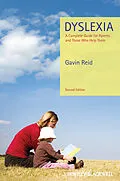The new edition of Dyslexia is written for parents of
dyslexic children and the professionals who work with them, and
provides information on the role parents can play in supporting
their dyslexic child. This updated edition contains new material
and up-to-date discussions of current research and programs.
* Empowers parents by providing them with strategies for dealing
with a wide range of concerns including dyspraxia and
dyscalculia
* New sections cover post-school issues, the emotional needs of
young people with dyslexia and information on how parents can help
at home
* Features information on some of the more popular interventions
for dyslexia, and critical evaluations of 'alternative
treatments'
* Includes first-hand accounts of parents' hopes,
successes and setbacks, and extensive lists of organizations and
resources
Autorentext
Gavin Reid, is an independent educational psychologist in Vancouver, Canada and a consultant to a number of organisations and charities worldwide. He is the co-founder and director of the Red Rose School for children with specific learning difficulties in Lancashire, UK and was visiting professor at the University of British Columbia in Canada. Previously he was Senior Lecturer at Moray House School of Education, University of Edinburgh. He is the author of 25 books including Dyslexia: A Practitioners Handbook (4/e 2009), Dyslexia in Context: Research and Practice (2004) and Dyslexia and Literacy (2002). He has run seminars for parents on dyslexia in over 60 countries and is also the parent of a young man with special needs.
Klappentext
This updated and expanded edition of the highly successful Dyslexia: A Complete Guide for Parents and Those Who Help Them develops many of the themes and ideas found in the first edition, and contains up-to-date discussions of current research and programs.
The book empowers parents by offering them the information and support that will allow them to play a vital role in helping their child to thrive and achieve their full potential. New to this edition are discussions on:
- Post-school issues, such as college and the workplace, providing invaluable insights into how the needs of people with dyslexia can be met
- Practical information on dealing with the emotional needs of young people with dyslexia, as well as their learning needs
- Sections on how parents can help at home, comments on some of the more popular interventions for dyslexia, and critical evaluations of 'alternative treatments'
The new edition also includes first?hand accounts of parents' hopes, successes and setbacks, and extensive lists of organizations and resources. It provides parents, carers, families and professionals with knowledge, strategies and insights into how children with dyslexia can be supported, irrespective of school system or the country they live in.
Zusammenfassung
The new edition of Dyslexia is written for parents of dyslexic children and the professionals who work with them, and provides information on the role parents can play in supporting their dyslexic child. This updated edition contains new material and up-to-date discussions of current research and programs.
- Empowers parents by providing them with strategies for dealing with a wide range of concerns including dyspraxia and dyscalculia
- New sections cover post-school issues, the emotional needs of young people with dyslexia and information on how parents can help at home
- Features information on some of the more popular interventions for dyslexia, and critical evaluations of 'alternative treatments'
- Includes firsthand accounts of parents' hopes, successes and setbacks, and extensive lists of organizations and resources
Inhalt
About the author.
Introduction and acknowledgments.
Chapter 1 What is dyslexia?
Chapter 2 Finding out about dyslexia.
Chapter 3 Finding out if my child is dyslexic.
Chapter 4 Learning to read and why it is difficult for children with dyslexia.
Chapter 5 Supporting my child with dyslexia.
Chapter 6 Overlapping difficulties: Dyscalculia.
Chapter 7 Overlapping difficulties: Dyspraxia and dysgraphia.
Chapter 8 Attention difficulties.
Chapter 9 Self-esteem and emotional development.
Chapter 10 Empowering parents.
Chapter 11 Parents' and children's voices.
Chapter 13 Issues for parents to consider.
Appendix 1 Assessment.
Appendix 2 Programs.
Appendix 3 DSM-IV and DSM-V: Criteria.
Appendix 4 Information: Sources, resources and organizations.
Appendix 5 Selected glossary.
References.
Index.
